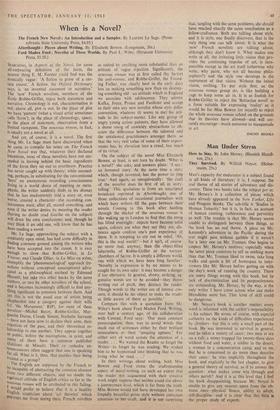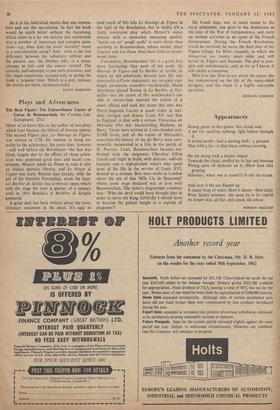Man Under Stress
They Survived. By Wilfrid Noyce. (Heine- mann, 25s.)
MAN'S capacity for endurance is a subject found in all kinds of literature; it is, I suppose, the real theme of all stories of adventure and dis- covery. These two books take the subject per se. Mr. Hersey's is a collection of pieces which have already appeared in the New Yorker, Life and Penguin Books. The sub-title is 'Studies in Human Tenacity,' but it is, in fact, an account of human cunning, ruthlessness and perversity as well. The trouble is that Mr. Hersey seems unable to distinguish between these things, so the book has no real theme. A piece on Mr. Kennedy's adventure in the Pacific during the war might pass without quibble if it weren't for a later one on Mr. Truman. One begins to suspect Mr. Hersey's motives; especially when the latter piece contrives to tell us nothing more than that Mr. Truman liked to swim, take long walks and quote a bit of homespun to inter- viewers like Mr. Hersey before getting on with the day's work of running the country. There are many things wrong with this book, but its lack of discrimination and its purposelessness are outstanding. Mr. Hersey, by the way, is the only writer I have come across who can make Hiroshima seem fun. That kind of skill could be dangerous.
Mr. Noyce's. book is another matter; every word is informed with the author's responsibility to his subject. He wrote, of course, with especial authority on the kinds of difficulties experienced by climbers—but this is only a small part of the book. He was interested in survival in general, and he takes a variety of cases: two men at sea on a raft, a miner trapped for twenty-three days without food and water, a soldier in the desert, a woman in a concentration camp, and so on. But he is concerned to do more than describe their cases: he tries implicitly throughout the book, and explicitly in the last chapter, to give a general theory of survival, as if to answer the question; what makes some win through and others perish? And it is at this level that I find the book disappointing, because Mr. Noyce is unable to give any reasons apart from the ob- vious ones—physical fitness, ability to adapt, self-discipline --and it is clear that this field is the proper study of experts. So it is the individual stories thai one remem- bers and not the speculation. In fact the book would be much better without the theorising, which raises in a far too sketchy and amateurish way a number of important and complex ques- tions—e.g., what does the word 'morality' mean in a concentration camp? And: what is the real difference between the voluntary sufferer and the passive one; the climber who, in a sense, chooses to fall—and the cancer victim? The sporadic half-attempts to put such questions, and the vague conclusion, succeed only in giving the book a 'popular' tone. Which is a pity, because the stories are there, incontrovertibly
K El El HARRISON































 Previous page
Previous page